Like any game genre, there were tons of great action/adventure games for the NES, but to me, it really comes down to the following four games (and a few other implied games).
- The Legend of Zelda: I’m surprised at how well this game holds up, even today. Sure, the game is very difficult and requires a level of mastery I rarely attained, but the game’s mystique has always kept me interested and wanting more. This is yet another proto-open-world game (I’m beginning to see a pattern here in early games that I consider great), where you simply begin playing in the middle of a gigantic video game world. In the Zelda games, these are referred to as the “overworld” and you navigate up there to find various dungeons, fighting monsters in order to find and reassemble scattered fragments of Triforce. Once you have all the fragments, you fight Gannon and save the princess.
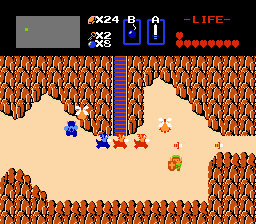
Link navigating the overworld
The overworld is a masterpiece of game design. It’s mostly open, meaning that you can go almost anywhere at any time. There are some areas that require an item or two to reach, but even then, you’re given surprising freedom of movement within the gameworld. The thing that keeps you out of certain areas are all based on how powerful the enemies are. Sure, you could head over to the graveyard at the beginning of the game, but chances are that you’ll have some trouble surviving there long enough to get anything good. I haven’t played much of the newer Zelda games, but there seems to be a distinct lack of “overworld” style gameplay that really causes the newer games to suffer. Like Metroid (another pseudo-open-world), the original Zelda is a game that places a premium on exploration. The world is huge and filled with secret rooms, stores and dungeons. The game doesn’t make you feel as isolated and alone as Metroid (you encounter many NPCs in Zelda), but it does a lot of similar things.
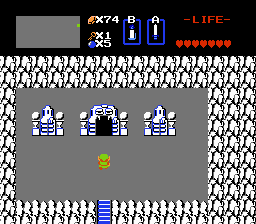
Link entering a dungeon
One of the greatest things about the game is the music. It’s amazingly good. Despite a decent amount of repetition, the music never really seems to get boring, which is kinda surprising (the dungeon music is perhaps less brilliant than the overworld stuff, but it’s still damn good). Likewise, the visual design of the world and the various creatures that inhabit it are excellent. The world is bright but not overly cheery and the dungeons are all ominous without being suffocating.
One other thing that seems silly, but which definitely differentiated this game from all the others was that the physical game cartridge was gold in color (rather than the standard, boring gray). Normally, I would think of gold as being gaudy and obnoxious, but the Zelda cartridge, manuals, and packaging all seemed to be somewhat classy. So perhaps I was just buying into the hype of the day, but hell, it worked.
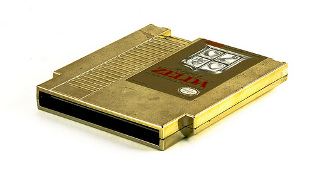
Zelda’s Gold Cartridge
This is actually a game I never owned as a kid. Winning the game was a group effort undertaken by several kids on my block, and it was a lot of fun. Due to various time constraints, I only got about halfway through the game as of this writing (that’s even relying on my tendency to cheat at video games), but it’s something I definitely want to finish replaying at some point. Other games in this series of posts (or this post itself) won’t be so lucky. But Zelda is a true classic, one of the best games of all time.
- Zelda II: The Adventure of Link: Having loved the first game, I naturally moved on to the sequel, which ended up being a very different game. There was still an overworld, but that was not the main arena for battle. Instead, you used the overworld as a way to get from one dungeon/cave/town to another, occasionally running into some enemies along the way, something more typically seen in RPG games. Indeed, this game built on the RPG elements of the original Zelda in many considerable ways, instituting an experience points system, allowing various magic spells, and of course, expanding upon the concept of collecting magic items and other special abilities. The other huge change in this game was that all of the combat took place in a side-scrolling action/platforming environment. This is a rather large change in gameplay style, though my young self didn’t seem to have any issue adjusting (the new and expanded RPG elements were enough to placate me). This game was made rather quickly after the first game, so perhaps Nintendo wasn’t sure if the original game’s top-down view would continue to work. In any case, the game’s controls were relatively well balanced, making it easy to pick up and once you got some of the more advanced abilities, the game gets more fun. It’s also worth noting that the overworld had more significant obstacles and choke points, making the game progress a little more linearly than the original. This was mitigated by the sheer size and scope of Zelda II’s world, but it’s something I found a bit lacking.
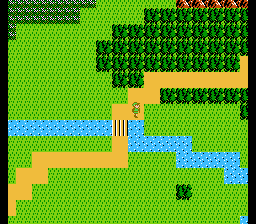
Zelda II’s Overworld
From what I can gather, this seems to be one of the least favorite Zelda games in the series. Having played only 3 myself (the original, this one, and Twilight Princess Wii), I’m not really a good judge, but I loved this game when I was a kid. I played through it at least 3, maybe 4 times. One time, a friend got his save files corrupted after getting pretty far into the game, so I volunteered to play the game up to that point for him so that he could continue on.
The music for this game was good and more varied, but somehow not as iconic as the original (which isn’t to say that it’s not iconic in its own right). The visuals and enemy design were a definite improvement though. The boss fights, in particular, seemed to be more memorable. One distinct step down in this game was the way it handled character deaths. In the original game, if you died in a dungeon, you would start back at the beginning of the dungeon. In Link, you’re given 3 lives, but if you die that many times, you end up back at the beginning of the game. So dying is more of a pain in Zelda II.
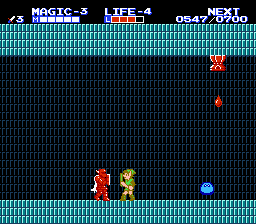
I hate fighting these guys
Now, replaying this game, I’ve only managed to get to the second dungeon (due to the way the overworld is constructed in this game, the dungeons/caves/towns are the star of the game, so that’s what everything gets associated with). This is mostly because I didn’t have time to figure out the appropriate cheat codes, but it’s also because this game is extremely long! At one point, you get to a screen that very much resembles the overworld of the first game. Malstrom has speculated that Zelda I was perhaps just a close-up view of a piece of Zelda II (See the map in his post – he also mentions that most of the new Zelda games are lacking in the overworld department).
Despite any complaints above, this game is still a classic and one of my favorites of all time. I’ve probably logged more hours on this game than any others in this post, which is pretty impressive. I doubt I’ll have time to completely revisit this game in the near future, but it would be worthwhile if I did.
- The Battle of Olympus: Given my undying love for Zelda II, it’s no wonder that I ended up loving this game as well. It’s basically a Zelda II clone in terms of action and fighting gameplay, only it uses Greek Mythology as a base. There’s not much of an overworld to the game (there is a map of sorts, but I wouldn’t call it an overworld in the Zelda sense), but it’s not a completely linear experience either. There are branching paths and backtracking, just not as much as we’ve seen in games previously discussed.
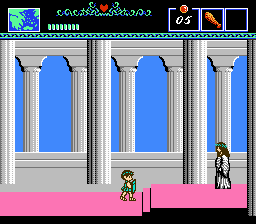
Visiting a god
Despite stealing gameplay elements from Zelda II, the game feels very distinct. I think a lot of the power of this game had to do with its reliance on Greek Mythology. You play Orpheus, a real figure from Greek Mythology, who goes on a quest to the Underworld to save his beloved Eurydice from her afterlife in Hades (if I remember correctly, the game is a somewhat less tragic retelling of the story). Along the way, you meet up with familiar gods (Zeus, Apollo, Hermes, etc…), mythological beasts (a Cyclops, a Minotaur, Cerberus, the Lamia (which I find amusing considering the current season of True Blood), a Siren, a Centaur etc…), and you collect various legendary items (Apollo’s Harp, the sandals of Hermes, etc…) All these familiar elements lend a timeless quality to the game, even if it isn’t the most innovative of it’s time (something that God of War would much later cash in on as well, though that game is probably more timeless than this one).
All of that said, this isn’t really as good as Zelda II. The platforming and fighting controls are a little more floaty and difficult to master, and some of the enemies in this game are ridiculous. In particular, I hated battling Cerberus. He has three heads, and you have to destroy each one to defeat him. The only issue is that after destroying one head, you have to be really fast because if you wait too long, it will regenerate. On the one hand, this was annoying as hell. On the other hand, it really stuck out in my head, and once I did manage to defeat him, there was a real sense of accomplishment.
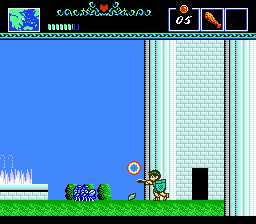
I didn’t get very far in replaying this game, so it’s hard to say for sure, but I can see the appeal to my younger self. The game very clearly depends on a love of mythology and Zelda II, but given that I enjoyed both, I have very fond memories of this game. It’s probably not something you’ll see in a lot of best-of lists, but it holds a special place in my gaming history.
- Castlevania III: Dracula’s Curse: Having played the first two Castlevania games at various friends’ houses, I ended up getting this game when it came out. I never really got far in either of the previous two installments of the game, but I really liked the feel of those games and the prospect of vampire hunting seemed fun to me, so I took the plunge with this game. Technically a prequel to the first two games, you play Trevor Belmont, a vampire hunter on a quest to defeat Dracula. Pretty simple stuff.
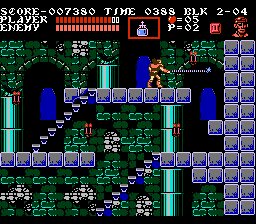
Trevor Belmot and his trademark whip
As gameplay goes, this is more similar to the original Castlevania. It’s more of a platformer than anything else, though it’s not completely linear. You can take different paths to get to Dracula’s castle, and depending on your choices, you can pick up companions along the way. These companions apparently wind up being pretty important throughout the game series, but for the purposes of this game, they’re pretty great (well, two of them are). The first one you could encounter is Grant DaNasty, a pirate who was corrupted by Dracula (which is kinda funny considering that pirates aren’t exactly saints themselves). Once you defeat him, he becomes human again and you can choose to have him come with you on your quest. He gives you the ability to jump higher and further than Trevor and he can also climb on walls, making some previously inaccessible areas available. He was one of my favorite characters and became the basis for a D&D character I played for years. Another character you could play was Alucard, who is actually Dracula’s son. Alucard would go on to star in what is often considered the best game of the Castlevania series, Symphony of the Night. If you chose to use him as your companion, you got the ability to use a fireball attack and you could also change into a bat. Finally, you could also play Sypha Belnades, who didn’t have much of a physical attack ability (and thus was probably the least useful of all the characters), but she made up for it a bit with some magical abilities.
Visually, the game was decent, though not exceptional. Same thing for the music, which is memorable and contains that iconic Castevania theme, but is otherwise not particularly special.
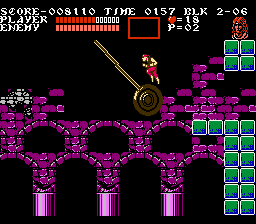
Grant jumps onto a swinging pendulum
In replaying this game, I have to admit that I’m surprised it held my interest so much back in the day. Granted, I do still love the mythology of the Castlevania franchise. Dracula is a fantastic villain in any medium, and video games are no exception (and the game makers certainly made that final bossfight count – it took me forever to beat him). The addition of Grant and Alucard (and to a lesser extent Sypha) also did a lot to help my interest in this game (I mean, come on, did you know that Dracula had a son? Holy shit man! That’s awesome!). I don’t necessarily shy away from a challenge, but man, the platforming and control scheme in this game is just plain shitty (things are improved a bit with Grant, who has a bigger leap and his ability to cling to walls also comes in handy). Unlike previously discussed games like Metroid and Zelda II, the controls here seem quite poorly balanced. So a big portion of the challenges in this game are only challenging because the controls are crappy. I do remember eventually finishing this game and yes, it was quite a good feeling of accomplishment, but looking back at that now, I’m still a bit surprised.
Aside from the platforming annoyances, it really is a good game, and apparently an influential one on the rest of the series. Alas, I’m not that familiar with other games in the series (I remember playing one on the PS2, but that game wasn’t very good), but perhaps I can change that in the near future. I have a lot of fond memories about this one, so perhaps a more lengthy visit in the future would be warranted.
Well that about wraps up this installment. Next up are the RPGs. I will be traveling this week though, so they might get short shrift (which is probably for the best, considering how much time I spent playing those damn games – time that I would never get away with these days).
Whoa whoa whoa
You’ve only played three games out of the Legend of Zelda series? Mark. What up dude? You have to at least play A Link to the Past and Ocarina of Time.
Wind Waker was lots of fun too, but I didn’t play that much myself. I loved Link’s Awakening and played it several times on my Game Boy back in the day (around 1995). I wouldn’t mind playing some of that now…
There’s a dead zone of console games in the mid to late 1990s (i.e. late highschool and college years), where for budgetary reasons the only games I owned were on my computer. I did play some of Ocarina of Time, I think (that’s the N64 one, right?), but it was on a friend’s console and I didn’t play much (same goes for a lot of games on the N64 and original playstation). I had a genesis, so I never played the SNES one either (nor did I play super metroid, which is apparently pretty awesome). If I ever get to the SNES/N64/Playstation era in this series, it may end up being a pretty short series of posts:p
Hmm, now that I think about it, Charles and I feel into the same sort of time gap but a little later. I think the PS2 came out when we were in college, or maybe just before, so we couldn’t afford that. Charles hadn’t even played anything on the PS1 until he borrowed my brother’s system.
We ended up playing mostly computer games too. We could pick up older games we had yet to play, and Charles had an old computer lying around that was able to play the oldies.